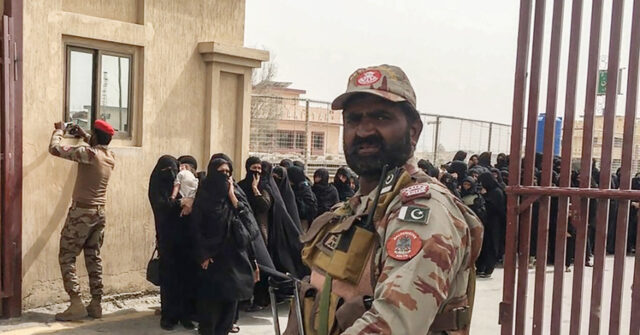Pakistan on Saturday vowed to “stand behind Iran” against Israeli airstrikes, but indefinitely closed all of its border crossings with Iran on Monday.
“Border facilities in all five districts – Chaghi, Washuk, Panjgur, Kech and Gwadar – have been suspended,” a senior official in Pakistan’s province of Baluchistan said Monday.
Border crossings into Iran were “suspended until further notice,” although hundreds of Pakistanis fleeing Iran were allowed to cross back into Pakistan. Border officials said commerce between Pakistan and Iran would still be allowed.
Pakistani Foreign Minister Isaq Dar said on Sunday that about 450 Pakistani “pilgrims” had been evacuated from Iran, with more expected to follow. Dar said Pakistani citizens were also leaving Iraq during the Israel-Iran conflict.
The Taftan border crossing said the number of returnees from Iran was up to 714 on Monday, as three busloads of Pakistani students arrived from Tehran. Meanwhile, 269 Pakistani nationals arrived on two special flights from the Iraqi city of Basra.
“The Ministry remains actively engaged with Iraqi Airways and all other relevant Iraqi authorities to ensure the safe and timely return of the remaining Pakistani zaireen in Iraq,” said a spokesman for the Foreign Ministry. “Zaireen” means “pilgrim.”
“All zaireen are further advised to remain prepared for travel at short notice. The Ministry of Foreign Affairs continues to monitor the situation closely and remains fully committed to facilitating the safe and orderly return of all Pakistani zaireen,” the spokesman added.
Pakistan’s population is around 97 percent Muslim, but only ten to 15 percent are Shiites, the form of Islam dominant in Iran. Iran and Iraq host some of the most important holy sites in the Shia tradition, so Pakistani Shiites travel to both countries for religious purposes.
The Hindustan Times reported on Monday that the Pakistani Foreign Ministry has established a 24-hour “crisis management unit” in the capital, Islamabad, to help Pakistani nationals return from Iran and Iraq.
Pakistani Defense Minister Khwaja Asif said in a speech to the National Assembly on Saturday that Islamabad would “stand behind Iran,” and all Muslim countries should do likewise, although he notably refrained from advising military action on Iran’s behalf.
“Israel has targeted Iran, Yemen, and Palestine. If Muslim nations don’t unite now, each will face the same fate,” he said.
“We stand behind Iran and will support them at every international forum to protect their interest,” he declared.
The Iranians were probably hoping for a little more than Pakistan’s full-throated support at international forums. On Sunday, more high-level Iranian officials were reportedly killed by Israeli airstrikes, including the intelligence chief of the Islamic Revolutionary Guard Corps (IRGC), Mohammad Kazem.
On Monday, Asif trashed a claim from IRGC commander Gen. Mohsen Rezaei that Pakistan – the only nuclear-armed Muslim country – agreed to launch a nuclear attack against Israel, if the Israelis deploy nuclear weapons of their own.
“Pakistan has told us that if Israel uses a nuclear bomb on Iran, then Pakistan will also attack Israel with a nuclear bomb,” Rezaei claimed during an interview with Iranian state television.
Asif said Pakistan has made no such commitment.
“Our nuclear capability is for the benefit of our people and defense of our country against the hostile designs of our enemies. We do not pursue hegemonic policies against our neighbours, which are being amply demonstrated by Israel these days,” Asif said.
Read the full article here
